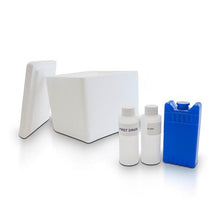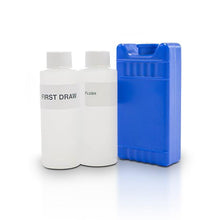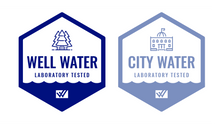First Draw & Flush Dual Lead in Water Test Kit
Tests your Well or City Water for...
- - Total Lead
- - Dissolved Lead
It’s never been easier to test your well or city drinking water for lead – a toxic metal that can be harmful to both humans and pets. The WaterCheck Dual Lead Test kit will test for lead content in water two critical ways, using both a “first draw” sample and a “flush” sample. This dual lead in water test kit provides a comprehensive overview of your water’s lead levels and can help you pinpoint if the source of lead is your fixtures or deeper in your plumbing system.
Key Features:
- EPA-approved process detects unhealthy levels of lead
- Easy-to-use kit – just turn on the faucet and collect your water sample
- Lab testing results in only 5 to 7 businesses days* -- more accurate than other in-home test kits
- Suitable for analyzing both well water and city water
- ISO 17025
- NELAP Accredited
Return shipping not included.
NOT included in the test kit is the return shipping of the water sample. We will be happy to extend our UPS
rates to you — just call us before you are ready to collect your sample and we can email a return label at
that time. If you are performing testing to meet regulatory requirements or if you believe your results may be
used for litigation purposes, please contact us for more information about testing packages designed for those
situations.
*from receipt of the water sample


*from receipt of the water sample
IT'S AS EASY AS 1-2-3

1. Collect a sample of your water
Simply fill the kit’s included bottles with your drinking water samples and complete the enclosed form.

2. Ship it to our laboratory
Return your kit to our laboratory using guaranteed next-day delivery or drop the kit off if you are in the neighborhood.

3. Receive your in-depth report
We'll give you an easy-to-read report that has your water test results compared side-by-side with national EPA standards. If you need help with the results, just give us a call.
Customer Questions
Lead content can vary throughout the day. Even hot water can contain more lead than cold water. The Dual Lead Test Kit allows you to test your water several ways, with EPA-approved lab diagnostic results. You’ll get concrete answers on how much lead is in your water.
Water quality can vary greatly based upon natural fluctuations in the water source and the types of treatment techniques utilized by the water department. If you are on a private well, there are no regulations that require regular testing of the water, so you are responsible for ensuring the water is safe to drink. The EPA recommends minimally testing your water at least once a year for bacteria and nitrates.
The Dual Lead Test Kit takes about 5 to 7 business days to process, from receipt of your water sample.
Some lead water testers utilize strips that you place in your water, offering immediate readings. However, these tests often provide only a color-coded result – good or bad – without providing specific lead levels. Lab testing provides a more detailed analysis of your water’s specific mineral content.
Your water is analyzed in our labs using Kemio™ Heavy Metals, the only EPA-approved equipment for rapid testing of potable water.
Yearly testing is recommended. If you have a specific concern, get your water checked more regularly using a lead in water test kit.
Some municipalities recommend running your water for a few minutes to flush any lead content from faucets or pipes. While this may work for trace amounts, a high volume of lead in your water should be investigated further.
Resources

HOW DOES LEAD GET INTO YOUR DRINKING WATER?
Think only older homes and neighborhoods are at risk of lead leaching into their water? Think again. Lead can get into your drinking water system through a variety of plumbing materials – including a home’s faucets and pipes, as well as a municipal system’s water main pipes and service lines. Water that has a high acidity level or low mineral content is more likely to corrode pipes and fixtures – opening the door to potential lead exposure. Hot water out of your tap also has a higher probability of containing lead than cold water.
In addition to the type of water in your home, the age of your home or city’s infrastructure can be a factor in whether lead is likely to enter your supply. Prior to 1986, many homes and cities used pipes with some lead content. Brass or chrome-plated brass faucets can also be a source of lead contamination. In fact, it wasn’t until September 2020 that the latest regulations for the Safe Drinking Water Act (SDWA) reduced the maximum allowable lead content in plumbing fixtures and pipes to be a weighted average of 0.25 percent calculated across the wetted surfaces of pipes, pipe fittings, plumbing fittings, and fixtures and 0.2 percent for solder and flux.
You can’t see, smell or taste lead, so how do you know if it is in your drinking water?
The CDC recommends homeowners reach out to their local water authority for more information about the pipes in their area. They also note the importance of testing for lead within the home. Since lead content can vary depending on the time of day, season and volume of water being used, water sampling tests that measure water at different points can provide a broader picture of possible lead content.
HOW DOES LEAD EXPOSURE AFFECT YOU, YOUR PETS AND YOUR FAMILY?
According to the US Environmental Protection Agency (EPA), prolonged exposure to lead can cause a variety of health problems – from nuisance issues like stomach upset to serious and life-altering concerns like brain damage.
Children and infants are especially susceptible to the risks associated with lead exposure. The toxic metal can accumulate in the body and blood supply over time. The CDC reports that there is NO safe blood lead level in children. Even minor exposure can affect a child’s brain development, hindering their ability to pay attention and learn for a lifetime.
Even pets can be affected by lead exposure in their water. Just like in humans, it can cause stomach issues. It can also lead to neurological issues including lethargy and behavioral changes.

The WaterCheck™ Advantage

We are a certified laboratory with many specific water tests and kits designed to test for harmful bacteria and chemical contaminants. Private wells require closer attention because they are not regulated by your local health department or treatment facility. The WaterCheck™ product line includes three tiers of well water testing kits. Based on the analysis, we will provide you with a detailed report of how safe the water is. We are here to ensure your water is free from contamination and can be safely consumed.
RELATED PRODUCTS
Fast Lead (single sample)
This test is designed to meet the regulatory lower detection requirements of the Lead and Copper Rule.
Complete RO Screen
The Complete RO Screen was developed to be the most complete analysis available for reverse osmosis design. The Complete RO...
Informational Glyphosate
For those who may not recognize the chemical name Glyphosate, it is the most widely used herbicide on the market...











